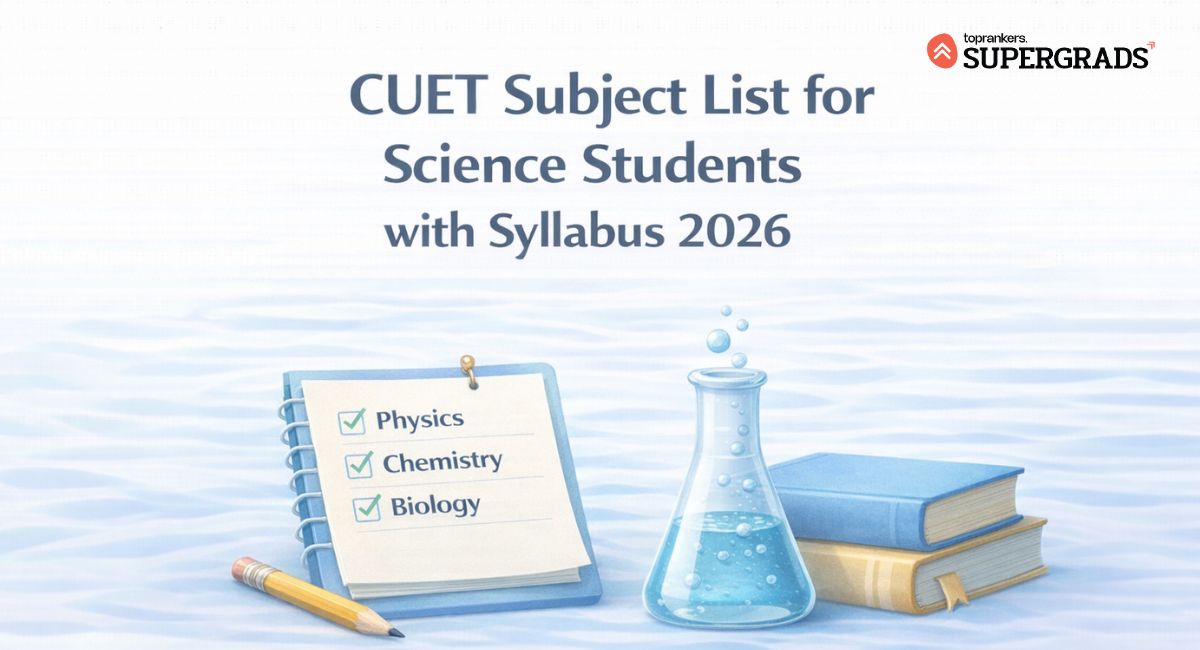CUET Subject List for Science Students with Syllabus 2026
January 30, 2026
Overview: Discover the intricacies of CUET's diverse science subjects and explore the CUET Subject list for science students! Learn how CUET transforms the scientific landscape for students aspiring to India's central universities, from core sciences to unexpected multidisciplinary topics.
The Common University Entrance Test (CUET) is a starting point for students interested in studying science at India's central institutions. The CUET subject list for science students, which has diverse disciplines, allows students to demonstrate their scientific understanding.
- The core science subjects include Physics, Chemistry, Biology and Mathematics.
- Physics, Chemistry, Biology and Mathematics have the maximum number of registrations in CUET.
CUET Subject List for Science Students 2026
In a society where scientific education is sometimes regarded through a narrow lens, the CUET entrance exam broadens views by highlighting science's multidisciplinary character and the interrelationships between various fields.
- It assesses students' fundamental understanding, adaptability, and understanding of changing scientific subjects.
- This article focuses on the CUET disciplines for scientific students, their fundamental relevance, and strategies for mastering each domain.
- It also provides an accessible table with course names linked directly to their particular syllabuses.
As you ask how many many subjects are in CUET for science students, the core subjects include 4: Physics. Chemistry. Biology and Maths. Rest all the other relevant subjects in the CUET subject list for science students to pursue CUET Courses 2026 are mentioned below:
| Subject | Details |
| Physics | Physics is the study of matter and energy and forms the backbone of many technological innovations. Topics usually include mechanics, electricity and magnetism, optics, thermodynamics, and modern physics. |
| Chemistry | This subject delves into the composition, structure, and properties of substances. It's divided into organic, inorganic, and physical chemistry, covering atomic structures, chemical reactions, and more. |
| Biology | Encompassing botany and zoology, biology studies living organisms, exploring genetics, evolution, physiology, and ecology. |
| Mathematics | Mathematics provides tools to describe and understand the world. Topics span algebra, calculus, geometry, trigonometry, and statistics. |
| Computer Science | As the digital age advances, computer science fundamentals like programming, data structures, and algorithms become increasingly important. |
| Environmental Science | Given the global environmental challenges, understanding topics like conservation, pollution, and sustainable development is essential. |
| Psychology | This explores human behaviour and mental processes, covering cognitive and developmental psychology, human behaviour, and psychological disorders. |
| Home Science | A blend of science and art, home science covers nutrition, resource management, human development, and textiles. |
| Agriculture | Vital for a country like India, agriculture studies encompass crop production, horticulture, and animal husbandry. |
| Anthropology | This study of humans and societies includes human evolution, socio-cultural anthropology, and biological anthropology. |
CUET Subject List for Science Students PDF Download Links (Syllabus)
The CUET syllabus includes core disciplines such as Physics, Chemistry, Biology, and Mathematics and multidisciplinary domains such as Environmental Science and Computer Science.
- This combination ensures that students' knowledge is thoroughly assessed, preparing them for a variety of academic options at central universities.
- For an in-depth look at the available subjects, you can download the syllabus for each subject in the CUET subject list for science students.
Here's a helpful table that will take you directly to the detailed syllabus for each subject in the CUET science subjects list:
| Course Name | Syllabus Link |
| Physics | Click here |
| Chemistry | Click here |
| Biology | Click here |
| Mathematics | Click here |
| Computer Science | Click here |
| Environmental Science | Click here |
| Psychology | Click here |
| Home Science | Click here |
| Physical Education | Click here |
| Agriculture | Click here |
| Anthropology | Click here |
Relevance of CUET Subject List for Science Students
The wonder of science is its depth and interconnectivity. While you ask why CUET is important for science students, each subject under the CUET science subjects list has its distinct importance:
- Fundamental Sciences (Physics, Chemistry, Biology, Mathematics): These form the core of scientific understanding, explaining natural phenomena, chemical reactions, biological processes, and mathematical principles.
- Applied Sciences (Computer Science, Environmental Science, Agriculture): These subjects demonstrate the application of core scientific principles in solving real-world problems, from software development to sustainable farming.
- Social Sciences (Psychology, Anthropology): These bridge the gap between pure and applied sciences, offering insights into human behaviour, societies, and evolution.
- Interdisciplinary (Home Science, Physical Education): These subjects showcase the fusion of multiple disciplines, blending biology with art in home science or integrating anatomy with sports in physical education.

Interdisciplinary Integration
Before CUET Preparation, you must know that the CUET subject list for science students is remarkable for its all-encompassing approach. It focuses not just on fundamental and applied sciences but also on fields that provide a multidimensional perspective:
- Societal Relevance: Subjects like anthropology and psychology equip students to understand societal dynamics, cultural shifts, and human behaviour. This knowledge is crucial in an increasingly globalized world.
- Sustainability: With challenges like climate change and environmental degradation looming, subjects such as environmental science stress sustainable solutions, integrating traditional knowledge with modern innovations.
- Health and Lifestyle: Physical education and home science not only focus on personal well-being but also teach students about societal health, nutrition, and the importance of a balanced lifestyle.
Preparation Strategy for CUET Science Subjects 2026
Now that you know how many subjects are in CUET for science students, you must also learn the preparation tips to study them well.
- Understand the Syllabus: Begin by thoroughly understanding the CUET syllabus for each subject from the CUET subject list for science students. Familiarize yourself with the depth and breadth of topics.
- Prioritize Subjects: Depending on your strengths and the course you are targeting, prioritize subjects. Allocate more time to subjects you find challenging.
- Practice Regularly: Regular practice, especially for subjects like Mathematics and Physics, is crucial. Utilize sample papers and previous years' CUET question papers.
- Stay Updated: It is beneficial to stay updated with current trends and developments in subjects like environmental science and computer science.
- Integrate Learning: Try to see the interconnectedness between subjects. For instance, how chemistry plays a role in agriculture or how mathematics is used in physics.
- Seek Guidance: Join SuperGrads CUET coaching classes or discussion groups. Interacting with peers and teachers can provide new perspectives and clarify doubts.
- Review Regularly: Periodically review what you've studied. This helps in retention and understanding.
Key Takeaways
The CUET offers a broad range of disciplines for science students, reflecting the depth and diversity of the scientific field. You can refer to the CUET subject list for Science Students when selecting your subjects for CUET.
- Download the syllabus PDF for each subject and understand the topics clearly.
- Allocate more time to subjects like Mathematics and Chemistry to clearly understand formulas.
- Do regular revisions for better retention and understanding.
- Seek expert guidance to earn a place in a recognized college through CUET.
Frequently Asked Questions
Does CUET replace the need for other entrance exams for science courses?

How diverse is the science subject list in CUET?

Is the CUET syllabus standard across all central universities?

How does CUET's approach to science education differ from other entrance exams?

Are there any specific preparation strategies for CUET's science subjects?

How is the CUET scored, and what's a good score for science students?

Can I apply for non-science courses with my CUET score as a science student?






1750158060.webp)





SHARE